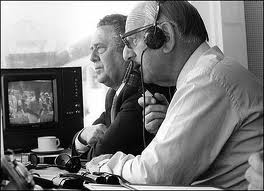At 87, Trevor Bailey is among the most senior of members of the SJA, as well as one with the most distinguished sporting records, having won an FA Amateur Cup medal as well as his more famed career as an all-rounder for England and Essex.

Fifty years on from when Bailey became captain of his county, IJAZ CHAUDHRY interviewed him about a career which included three decades as a sports writer and broadcaster
As a child I used to play cricket and soccer on the family lawn. In garden cricket, you were automatically out if you hit over the fence. Perhaps this early compulsion played a role in my latter habit of keeping the ball on the ground. Plus, I was a bad loser from an early age. That also played its part in my becoming a defensive batsman: I hated to lose my wicket.
During my early Essex days I also scored a century before lunch. Still the tag of “Barnacle”!
I led Essex from 1961 to 1966 but I was denied the captaincy of the country. I didn’t think much about it at that time as I was doing enough for England: opening the bowling, and batting in the top order. But in retrospect it hurt.
I had my own movie camera, a rarity those days. I carried it on tours and made films of the matches myself or asked others to do that for me. I handed all this to Sky a few years back.
After doing my bachelors from Cambridge, I taught English and history at my former school. But I left after only three years to become Essex County Cricket Club secretary. That job remained my main source of income for the next 13 years. Afterwards, it was journalism, writing, broadcasting on radio and television, public relations, the toy business, helping to run the Ilford indoor cricket school and so on.
My most valuable contribution to Essex as secretary was to arrange an interest-free loan from Warwickshire in 1965, which enabled us to buy the Chelmsford ground for the county. It has been the Essex headquarters since.
As Essex secretary, three times I signed a boy in his mid-teens fully certain that not only would he play for Essex but also gain Test selection: Barry Knight, Keith Fletcher and Keith Boyce.
In the mid-1960s I began my journalism career with the Financial Times and remained their cricket and football correspondent for over 25 years.
I only read newspaper reports of matches I did well in. Otherwise I knew better than the writers when I had fared poorly.
The 1972 Olympics was my most demanding and most enjoyable assignment as a journalist. In two weeks, I wrote on as many as 10 sports, ranging from soccer to fencing. I also covered the horrendous massacre.
I played soccer as an amateur for two Essex clubs: Leytonstone and Walthamstow. I played as centre half, inside right and also on the wing. Those were great days for amateur soccer. We never had a crowd of less than 5,000 for our home ties.
My greatest soccer glory came with Walthamstow in 1952-1953, when we reached the fourth round of the FA Cup, where we held the mighty Manchester United 1-1 at Old Trafford, a fantastic achievement for an amateur side. The replay took place at Highbury as our home ground had a capacity of just 12,000. In front of 55,000 people we lost 5-2.
In 1951-1952, I achieved the dream of every amateur footballer: winning the final of the FA Amateur Cup (with Walthamstow), at Wembley in front of a crowd of 100,000.
Brian Johnston was not only my first co-commentator on the Test Match Special team but also my favourite, especially for his great sense of humour. However, John Arlott was the master in describing the action in a lucid manner that only he could achieve. Norman Yardley’s excellent technical knowledge made him a wonderful summariser of all the on-field occurrences.
I received a really interesting cable from a close Australian friend during the Oval Test of 1981. It informed me that Australian television would be using Test Match Special‘s ball-by-ball commentary along with television pictures. Perhaps the TV channel had noticed that so many people watched television with the volume turned off and listened to our broadcasts instead.
On a few occasions schedules of major events in cricket and football clashed for me as a broadcaster. I always managed to attend both but it involved hectic travelling. The most memorable incident of covering both sports happened in 1974, when Germany was staging the football World Cup while England hosted India for a Test series. I moved between the two countries several times and was always rushing to airports.
I wrote 11 books. Writing the biography of my favourite cricketer, Garry Sobers, was a real pleasure. I visited Barbados to research it and Sobers and his wife really looked after me there.
Ijaz Chaudhry writes on cricket and other sports. For more about him and samples of his published work, visit www.sportscorrespondent.info
A fuller version of this interview is published on cricinfo.com